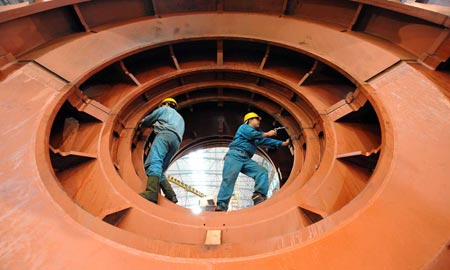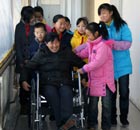Top Biz News
Dongfang Electric spreading wings abroad
By Liu Yiyu (China Daily)
Updated: 2010-03-03 09:49
 |
Large Medium Small |
|
 |
|
Dongfang Electric Corp employees working at a construction site in Deyang, Sichuan province. The group is planning to shift its focus from being an equipment manufacturer to an investor. LI JINGLU/CHINA FOTO PRESS |
"DEC plans to increase its share of overseas business to 30 percent from the current 19 percent over the next three years, to offset the slow growth in domestic demand for power generators, especially thermal power generators," Wang told China Daily in an exclusive interview.??
"We will explore emerging power markets including South America and Africa," the chairman said.
China's power investment is expected to slow in the next few years, forcing equipment makers to explore overseas markets, said Niu Pin, an industry analyst at Shanghai Securities.
"DEC is planning to shift its focus from being an equipment manufacturer to an investor," Wang said.
The group is also looking at acquiring overseas firms, which own core technologies or overseas market shares, the chairman said, without elaborating.
"We will also expand overseas investments through Build-Operate-Transfer (BOT), Build-Own-Operate (BOO) and Transfer-Operate-Transfer (TOT)," he said.
DEC is China's largest power equipment exporter, accounting for 40 percent of the country's power equipment.
India is the biggest overseas market for DEC, where demand for thermal power generators is still brisk as nearly 75 percent of the power is generated from burning coal, Wang said.
Other developing economies in Southeast Asia and the Middle East are also major importers of DEC's thermal power products partly owing to surging energy demand and growing interest in using coal to produce electricity.
China, on the other hand,is planning to decrease its reliance on coal-fired power. That in turn has led to less domestic demand for thermal power generators, the primary income earner for DEC.
Wang expects the group's revenue to reach 40 billion yuan ($5.86 billion) in 2010, a slower growth of less than 10 percent compared with earlier years. Between 2002 and 2008, the company's revenue grew annually by 36 percent. Last year DEC reported revenue of 37.31 billion yuan, up 9.9 percent from 2008.
New energy moves
DEC, which also provides 50 percent of the nuclear power units in China, said it plans to increase nuclear power related business to 30 percent from the current 20 percent and generate revenues of 10 billion yuan annually over the next three years.
China's nuclear power capacity is likely to reach 70 million kW by 2020, according to Pan Zhiqiang, chief researcher at China National Nuclear Corp. Industry analysts estimate that China will invest 900 billion yuan in the sector which currently accounts for 2 percent of the power generated. Unlike wind power generation, China is very advanced in nuclear power, the most cost-effective technology in the new energy sector, according to Guoyuan Securities.
Shanghai Electric, DEC's major rival, is planning to invest 1 billion yuan to develop its nuclear power business over the next three to five years.
Despite the growth of new energy business, sales from thermal power generators remain the largest contributor to DEC's revenue and accounted for over 50 percent of its total sales last year. The number, however, is decreasing while other products in the new energy sector are taking a larger share of the newly secured orders.
| ||||
With China planning to produce 15 percent of its energy from non-fossil fuel sources by 2020, most of it from renewable energy and nuclear power, DEC is diversifying its products in the new energy sector, by including solar energy equipment and components for electric vehicles.
The company also expects to cash in on the nation's plan to build smart grids that are designed to ensure stable power supplies generated by solar and wind energy. DEC is developing power storage equipment that can be used in smart grids.













